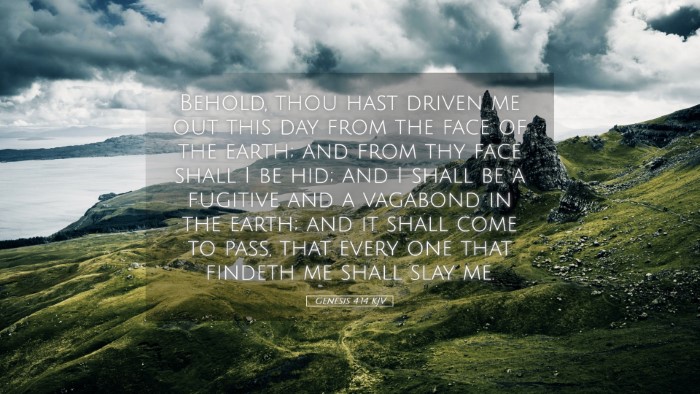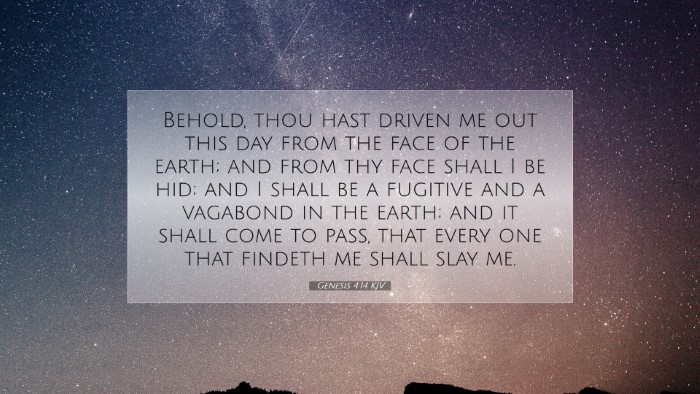Commentary on Genesis 4:14
Text of Genesis 4:14 (ESV): "Behold, you have driven me today away from the ground, and from your face I shall be hidden. I shall be a fugitive and a wanderer on the earth, and whoever finds me will kill me."
Introduction
This verse captures a profound moment following Cain’s murder of his brother Abel. It reveals Cain’s deep sense of alienation from God and humanity, as well as the consequences of sin. Commentators such as Matthew Henry, Albert Barnes, and Adam Clarke provide insights into the theological and moral frameworks surrounding this pivotal scripture. Here, we summarize key interpretations and applications relevant for pastors, students, theologians, and scholars.
The Context of Cain's Statement
Matthew Henry's Perspective: Henry emphasizes the weight of Cain’s sin and its repercussions. Cain, having rejected the offerings of God and destroyed his brother out of jealousy, now faces the consequences of his actions. Henry notes that Cain’s cry reflects not only a fear of physical punishment but a deeper fear of spiritual separation from God, highlighting the comprehensive effects of sin.
Albert Barnes’ Commentary: Barnes elaborates on the implications of Cain’s curse. He points out that Cain's alienation is not merely geographical but existential. Cain’s consciousness of being a fugitive encapsulates the fracturing of his relationship with both his Creator and creation. The realization of his moral failure drives him into despair, driven away from the very land which had once sustained him.
Suffering the Consequences of Sin
The verse implies that Cain is not only suffering the immediate consequences of his action but is also aware of a long-term reality that profoundly alters his existence.
- Adam Clarke's Insight: Clarke emphasizes the gravity of being a "fugitive and a wanderer." He draws attention to what it means to be estranged not just from God, but from community and home. This dislocation signifies the ultimate downfall of Cain’s identity—a man who was once a tiller of the ground destined to roam without rest or purpose.
- Understanding Cain’s Fear: All three commentators reflect on Cain’s declaration, "whoever finds me will kill me," indicating his fear of retaliation. This fear illustrates a principle that sin breeds violence and strife not only with God but within human relationships. The ruptured bond with his brother has now extended to humanity at large.
Theological Implications
This verse has rich theological ramifications. It serves as an early illustration of the human condition—estranged from God, marked by sin, and perpetually haunted by guilt. Scholars have often turned to this text to explore themes of sin, judgment, mercy, and redemption.
The Nature of Judgment and Mercy
Matthew Henry remarks: Despite Cain's grave sin, God still extends a form of protection to him. This paradox of judgment and mercy reflects God's complex nature. Henry argues that we see the beginnings of grace in God's promise that anyone who seeks to kill Cain will themselves face divine retribution, highlighting that God preserves even those who make grievous mistakes.
Human Isolation and the Need for Community
Albert Barnes further supports: The text encapsulates the essence of human alienation. Cain’s fear of being killed by others exposes a critical aspect of human relationships post-fall—vulnerability and mistrust. The need for community and support becomes ever more apparent as an antidote to sin and its consequences.
Metaphysical Insights into Wandering
Adam Clarke's reflection: Clarke elucidates that in being a wanderer, Cain symbolizes the broader human journey through life, searching for belonging and meaning while often feeling lost due to sin. This wandering reflects a spiritual state—a life disconnected from God and direction. It serves as a cautionary tale echoing through generations: separation from God leads to a wandering that is spiritually, emotionally, and relationally disorienting.
Practical Applications for Believers
For pastors and scholars, the insights gleaned from Genesis 4:14 offer rich ground for preaching and teaching:
- Understanding Sin and Its Effects: Recognizing the devastating impact of sin should evoke both caution and empathy. Cain’s story teaches us to acknowledge our missteps while understanding the broader human experience of alienation from God.
- Exploring God's Mercy: In light of Cain's fear and God's protective response, believers are reminded of the depth of divine mercy. This invites deep reflection on how we apply God’s grace in our interactions with those who err.
- Encouraging Community Support: As Cain’s experience illustrates the dangers of isolation, churches and communities should be places of refuge for those burdened by guilt and shame, healing through connection, not condemnation.
- Prayer and Restoration: Finally, this text calls believers to seek prayer for those affected by the desolation of sin—both for restoration to God and reconciliation amongst people.
Conclusion
The commentary on Genesis 4:14 provokes intense reflection on sin, alienation, and the indelible nature of God’s mercy. Through the insights of respected commentators, we unravel the complexities of Cain’s lament, leading us to ponder our own spiritual walks. Each individual’s journey might reflect aspects of Cain's—yet in recognizing our failings, we also grasp the profound hope embedded within the narrative of redemption.


